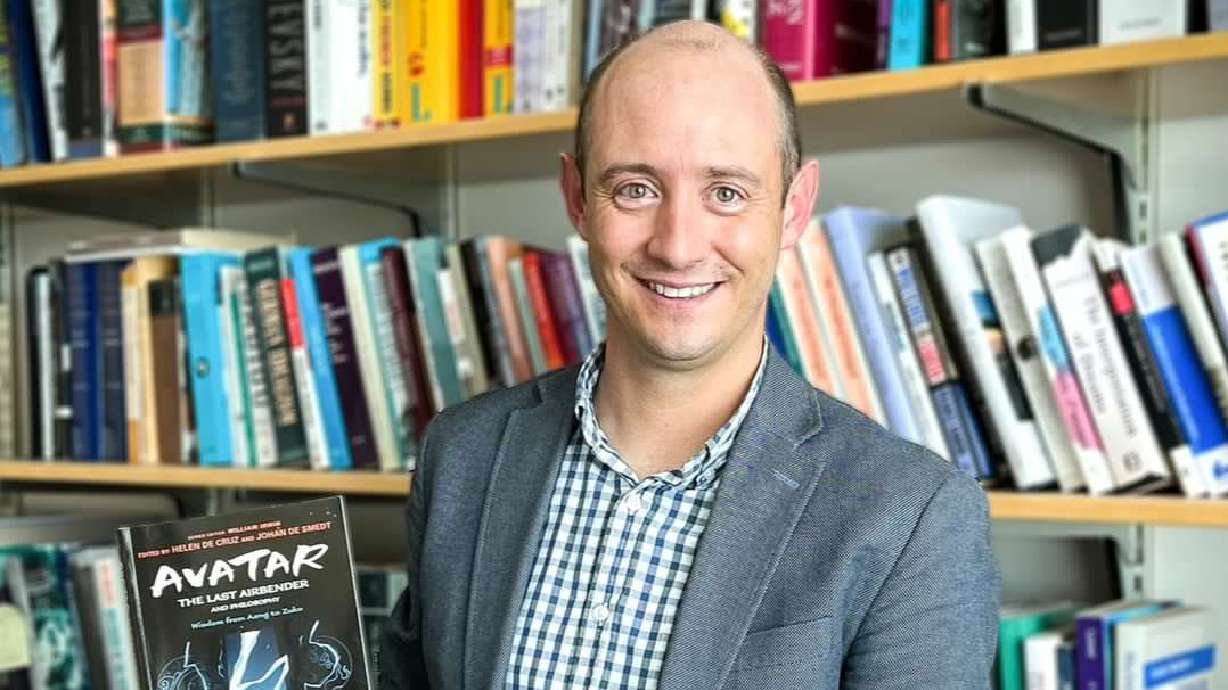Estimated read time: 5-6 minutes
This archived news story is available only for your personal, non-commercial use. Information in the story may be outdated or superseded by additional information. Reading or replaying the story in its archived form does not constitute a republication of the story.
PROVO — A BYU professor is helping make philosophy more accessible to people through a chapter of a book he wrote that explored redemption, identity and determination in the TV series "Avatar: The Last Airbender."
Assistant professor of philosophy Justin White was working on an academic paper during the pandemic, when he would watch the animated series "Avatar: The Last Airbender" with his children. He noticed the character Zuko had a redemption arc that mirrored some of the moral philosophy and practical identity concepts he was writing about in his paper.
"There are connections here with Zuko and his back-and-forth and trying to change, but the difficulties he encounters as he is trying to change that relates to this other paper," White said. "Then I saw there was a call for papers ... and I was like, 'Well I have a paper that fits this!'"
The call for paper submissions was for a book that is part of the Blackwell Philosophy and Pop Culture Series; the newest addition was focused on philosophy in "Avatar: The Last Airbender."
Other books in the series have looked at philosophy in "Wonder Woman," "Star Wars," "Dune," "Stranger Things" and more.
The TV show "Avatar" hits home with a lot of people because of its playfulness and sense of humor mixed with rich relationships, relatable characters and a beautiful portrayal of the human condition.
Although technically a children's show, the series discusses heavy topics and praises the power of friendship, love and forgiveness — all while creating a fantastical world where people can control the elements.
"I submitted a proposal for the chapter and they accepted it and so I again very carefully watched 'Avatar' looking for almost everything on Zuko and where he is coming from," White said.
White's chapter "Being Bad at Being Good: Zuko's Transformation and Residual Practical Identities" analyzes Zuko's journey and transformation from a disgraced prince of the Fire Nation to a hero who helps the Avatar take down his tyrannical father. He starts off banished from his country, tasked with finding the Avatar to regain his honor.
Just Published: Avatar: The Last Airbender and Philosophy https://t.co/BPN5jGyU7K
— And Philosophy (@andphilosophy) December 1, 2022
Zuko's aspiration leads him to make some major life changes in season two, but he also finds himself reverting to past behaviors, acting in a way he isn't proud of. Frustrated that he has not become the person he wanted to be and realizing the person he is feels wrong still, Zuko is determined to reunite his fractured identity that is causing him turmoil.
White's chapter discusses how as the third season unfolds, Zuko realizes how difficult it can be to be a good person as he switches to the "good" side — he even has a scene where he iconically yells, "Why am I so bad at being good?"
"Zuko shows really nicely the ways in which we can commit to change and to be better or different, but that we might find ourselves struggling to act in accordance with our commitments," White said.
Every misstep Zuko makes is an expression of part of his identity he embraced for a long time but is now trying to leave behind. Despite challenges, Zuko keeps working at it and persists until he becomes an honorable leader of his country who helps end the war.
"When we aspire, we commonly find ourselves being bad at being good," White said. "Zuko poignantly reminds us that becoming who we want to become — becoming good at being good — is often a struggle during which we think of ourselves as we want to become and persist through setbacks including the times we find ourselves being bad at being good, guided by the very identities we want to leave behind."
White said similar to Zuko, everyone finds themselves in situations where who you are is in conflict with who you think you should be or who you want to be. People have a tendency to think of their "true self" as who they want to be and commonly say "that's not really who I am" when they mess up, White said.
The mistakes we make are also part of who we are, he said. Acknowledging the things we don't like about ourselves and understanding what we would like to change allows for real growth, helping us to become who we really want to be.
"We can find ourselves falling back into the ways we don't want to be, the ways we hoped we left behind. We don't need to despair and give up hope, but we can keep working through these setbacks to bring about the changes that we've desired," White said.
Making philosophy more accessible
Philosophical questions are often based on basic day-to-day things, but people sometimes perceive philosophy as esoteric, White said.
"Avatar: The Last Airbender and Philosophy" raises political and ethical questions on a lot of "interesting" topics that are major components of the show, he said. White hopes that books like this one help people realize you can look at moral questions and debates through beloved fictional characters to make philosophy easier to understand and more applicable to lives.
"A lot of philosophy research can be sort of not accessible. I work in my general work to make it more engaging and accessible to a broader audience," White said.
White even uses the TV show "The Good Place" to help him teach concepts in his Introduction to Philosophy course at BYU.
"Backsliding in Bad Faith: Aspiration, Disavowal and Residual Practical Identities," the academic paper he was working on before analyzing Zuko, has been accepted to the Journal of Ethics and Social Philosophy and will be published soon.










